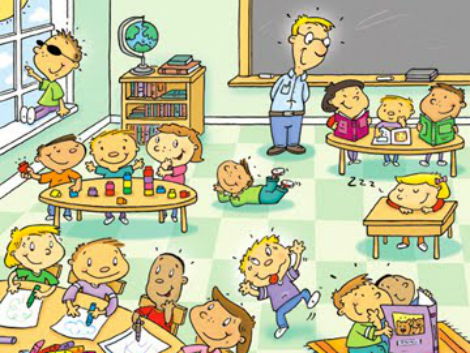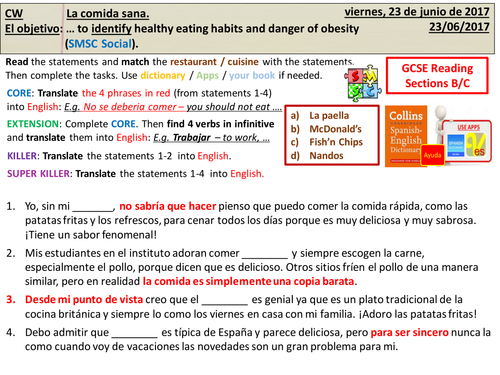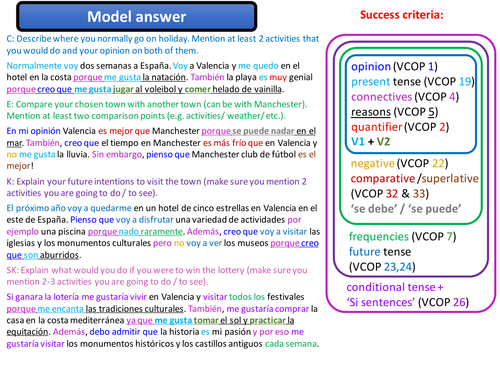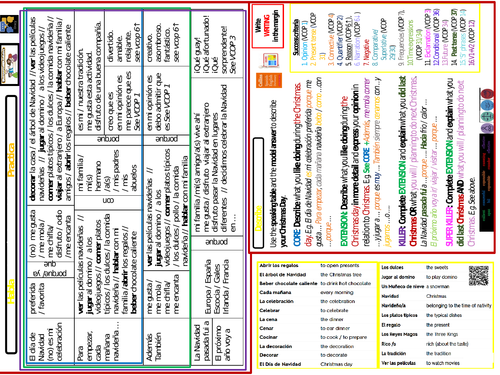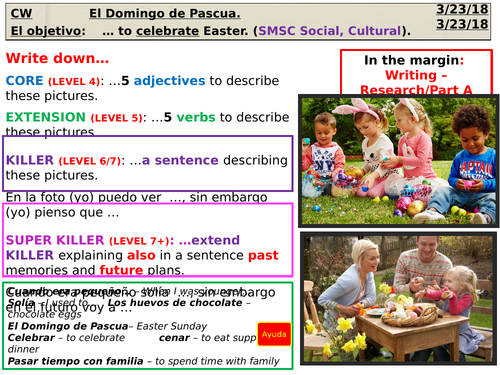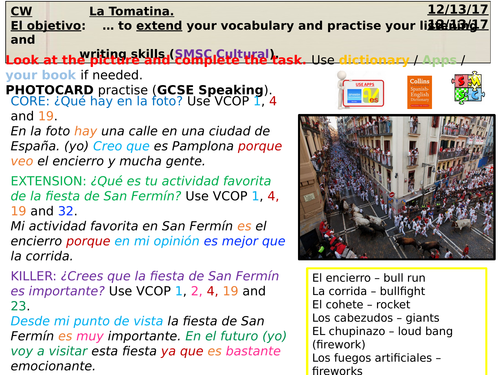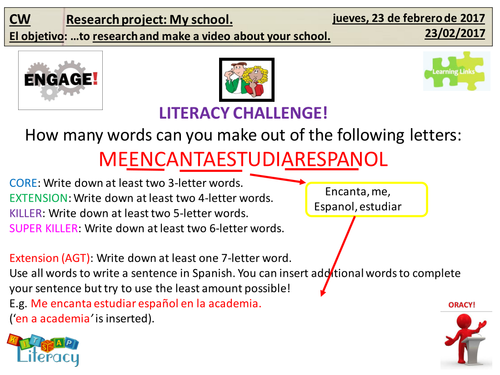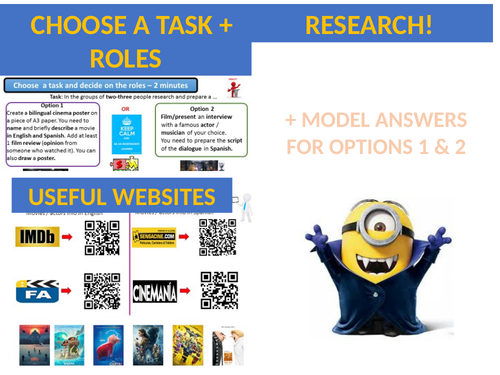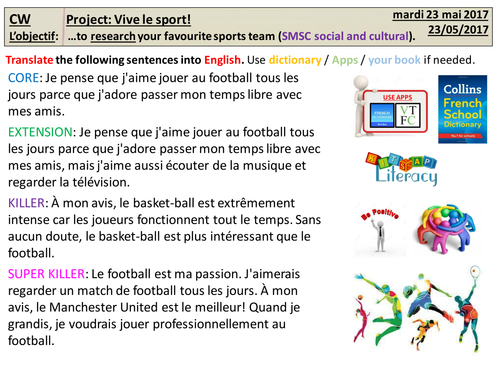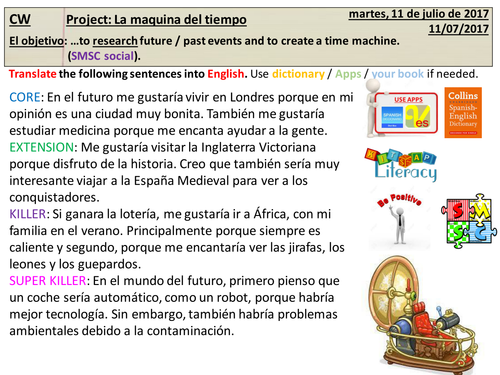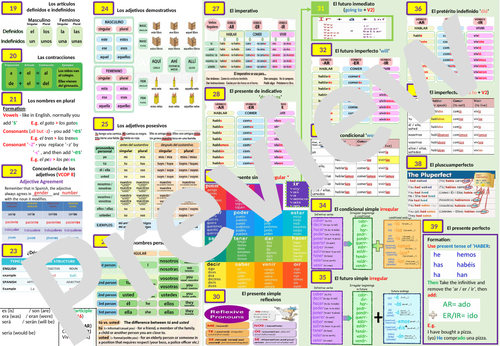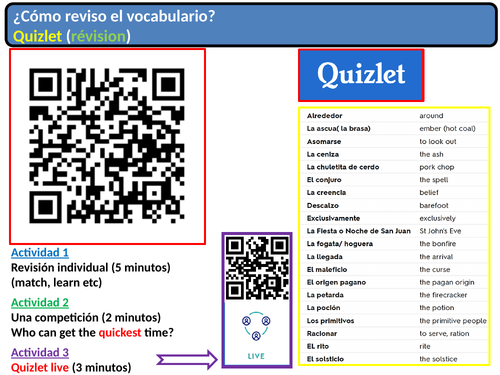
121Uploads
35k+Views
5k+Downloads
Languages
Bundle

Studies - AQA GCSE Spanish - 4 lessons + speaking framework and model answer+ research project
This is a bundle of 4 lessons and a research project in relation to the topic of Studies in the AQA GCSE specification (originally for the early GCSE year but can also be used for revision for years 10 &11). These lessons are prepared for the tropics of opinions and reasons on the schools subjects, typical school day and school rules. The bundle is finalised with the research project which includes the structures and grammar from the whole topic, that can be changed / adapted / differentiated further to your needs. I have also included the speaking framework for the Part 3 of the Higher Tier exam that can also be used in writing practice.
Bundle

Mi ciudad - Activities in town, photo card worksheet and project AQA GCSE
This is a brief bundle for the young GCSE Spanish class or for the revision of the older students. I included 2 versions of my observation lesson (practice of Section C reading exam task), a photo card help worksheet (can also be used for the topic writing practice) and a research project about a favourite town with the model answer that practically summarises the topic vocabulary and can also be used for the revision tasks (can be amended if needed).

Healthy Schools week PSHE - La comida sana - KS4 Spanish AQA new spec
This is the lesson I have prepared for the healthy schools week for my year 9 and 10 Spanish GCSE classes. It consists of starter, tongue twister to practice phonics, a mini-test on adjectival agreement and articles (I love those surprised faces when they see the word 'TEST'), quizlet task to learn / revise vocabulary on food, quizlet live to consolidate the same, AQA Listening Section A task with explanation on tips and strategies (my usual walk-through, I usually read it out myself) with self-assessment. It is followed by the Reading Section A task on obesity case in Mexico (from EL PAIS online journal) with the same walk-through and Oracy task (slide 20). I would usually read the text and pause for the students to say the word I was about to read so they actually practice phonics and follow the text. For the end I asked them to prepare a poster for the year 6 students that are coming to school for few days to look around. There are also some mini-plenaries here and there. The origin of the Listening task is VIVA AQA Higher GCSE book. Buena suerte!

Research project (Motivational triggers) for KS3 Spanish - Buen Viaje (Holidays) (AQA new spec)
This is a research project lesson (or two lessons really) that I created for my year 7 Spanish students. The writing example can be easily adapted if more structures are to be added. The idea is to promote independent learning via research. Students have to research information about the place that they would like to visit (any place in world really but I encouraged to visit Spain). Students decide on the task and start researching relevant information about the chosen location using their iPads/ Chromebooks. At the same time they create a poster or a travel brochure with pop-up images (!!!) about the chosen location. During the second lesson they distribute the writing task bullet points in-between the members of the group and complete a piece of writing as per success criteria and model answer. In the end they stick their written notes (or attach them) to their poster /travel brochure. The whole process takes about 2 lessons and is perfect for the end of the topic as you can incorporate all of the structures / vocabulary learned during the term! Note: the writing example is oriented on the revision of tenses studied this year, holidays, weather and location vocabulary. Please let me know if you have any other ideas on how this project can be implemented. If you still have some time left you can enjoy few games I have inserted to simply have fun during the (possibly) last lesson of the year.

Your Christmas Day - KS3/KS4 Spanish (AQA)- Observation 1c/2a
This is a Christmas lesson that I created for my higher KS3/KS4 Spanish students and mainly for my lesson observation. The idea is to have some fun and to do some writing as well!
The lesson starts with a friendly - easy starter and pronunciation slide to learn how to pronounce some Christmas / winter related words. Then we move on to a quizlet task to learn / revise some X-mas vocabulary and Rally Coach activity to check whether we remember the words. I have then included a conjugation activity with the Christmas verbs (you need some dices!) followed by a competitive translation activity (make sire you have similar ability students working together). The students then use a trap door structure (table) to speak about their Christmas day and then I tell them about my Christmas day in a similar manner as suggested by previous activity. I first use pictures only and then show them the model answer and the grammar success criteria. After they write down their responses we move on to playing quizlet live and Hangman. Enjoy!

El Domingo de Pascua (SMSC - Cultural) Spanish (AQA) KS3/ KS4 lesson
This is an Easter lesson that I created for my higher KS3/KS4 Spanish students. The idea is to have some fun and to do some writing as well!
The lesson starts with a friendly - easy starter, lesson plan and pronunciation slide to learn how to pronounce some Easter related words. Then we move on to a quizlet task to learn / revise some Easter vocabulary and Rally Coach activity to check whether we remember the words (translation practice). I have then included a conjugation activity with some verbs (you need some dices!) followed by a competitive translation activity (make sure you have similar ability students working together). The students then use a trap door structure (table) to speak about their Easter day and then I tell them about my Easter day in a similar manner as suggested by previous activity. I first use pictures only and then show them the model answer and the grammar success criteria. After they write down their responses we move on to playing quizlet live and Hangman. Enjoy!
Bundle

Festivals and Celebrations bundle Cultural / SMSC
This bundle includes a collection of eight lessons created for few international celebrations such as Christmas and Easter as well as some traditional Spanish Festivals (e.g. Las Fallas, San Fermin, La Tomatina). I have tried to use some videos and games to make it more engaging whilst still providing students with some grammar / AQA GCSE exam practice. I also included the cultural starters I used as well as a template of my drill for teaching students how to answer AQA GCSE Reading parts A and B based on the text about Aste Nagusia, a Basque festival.
Bundle

Christmas bundle- Spanish/French - KS3/KS4 AQA
This a small bundle of two (possibly three) lessons for KS3/KS4 Spanish students. I also attach its analogue in French. Part of it is a research project than can take 1-2 lessons and another one is a lesson to describe your Christmas day in Spanish!

Spanish Festivals: La Tomatina - Spanish KS4 AQA Writing 3
This is the lesson that I have prepared for my y9/y10 in relation to the topic of Spanish culture (Festivals & Celebrations). The lesson starts with the starter about San Fermin Celebration (photo card style) (it was previous lesson title and I always try to link things together) and following review of lesson outcomes we move onto to trying to sing along with Enrique Iglesias (click on the 3d man for the youtube link or search for a YouTube video with lyrics). Students will then recap on SER conjugation in present tense and learn new / revise already known vocabulary on the topic of La Tomatina celebration using Quizlet and Quizlet live online tools. I have then included a video (see link) of Rosa from SpanishPod101 (see their channel in youtube) describing the celebration of La Tomatina. Even though the video is in Spanish and Rosa speaks really quickly, there are subtitles in English so that all students have a chance to listen to a native speaker and at the same time understand what the video is about (note: I personally find the Spanishpod101 videos amazing as they address quite a few cultural / grammar / pronunciation and other aspects so I would recommend letting your students know that a lot of resources are available for free. Consequently, students answer quiz questions about the video and move on to the grammar activity. They revise present tense and then analyse how to form 'Impersonal SE' structures. Then they do a quick test to check understanding and move on to a Writing Section 3 activity (translation from English into Spanish). They self-assess it and play Pictionary. Please note that there is also a handout to make the tasks easier and faster to access. Enjoy!

AQA GCSE (teaching from 2016) : Town and local area - Speaking - Photo card Model answer 1
This is the handout for my GCSE Spanish class to prepare for Speaking assessment. It includes brief success criteria and where to find it, what to include and a template for an answer. I have included both the PowerPoint slide and the handout.

Free time activities - Spanish - AQA GCSE new spec Part 3 HT - Conversation - Speaking frame
This is the speaking framework that I wrote for the early GCSE classes. The framework was originally designed for them to write an essay that they might use for the speaking test or keep it in file to revise prior to the exam. I have also used it as a writing model answer.
I have left references to the VCOP mat in case someone wants to put their numbers in, alternatively, just delete them as I left the names of the structures.

School Rules - Spanish - AQA new spec -Exam practice (Reading, Section C)
This is a 2b lesson on school rules for a GCSE Spanish class that I happened to have an observation with (unexpectedly!). The lesson includes a literacy starter (students have to find and amend the mistake in the sentence), a mini-plenary on grammar in relation to the starter, a tongue twister slide to practise 'i' sound, a mini-test on present tense verbs conjugation ( I often give these ones), a mini-test on articles, a pronunciation slide and a quizlet on the words that would be used in the reading task, and a reading task itself. I am trying to teach them how to approach these tasks in the most effective way so they underline the words they know and find out the ones they do not. I wrote the text myself on the basis of the one from the specimen materials for it to have a similar structure to the one they will see in the exam. Finally they self-assess their work (and learn new words!). This lesson includes the explanation on how to use 'Spanish Dict Box' application to finds out the meaning of unknown words.

Research project for KS3/KS4 Spanish - My school
This is a research project lesson (or two lessons really) that I created for my year 9 Spanish students. It can also be used for older students as the model answer has quite a list of grammar / some more can be added. The idea is to promote independent learning via research. There are two choices: a documentary about your school or an interview with between a student from your school and a school in Spain. Students decide on the task, the roles and start researching relevant information using their iPads (one of the students needs to summarise the information that others found). They then have to prepare a script in Spanish and to make a video using iMovie or any other video application. If there is little time I would suggest them to present it and I would film it. The whole process takes about 2 lessons and is perfect for the end of the topic as you can incorporate all of the structures / vocabulary learned during the term!

Free time activities - Spanish - AQA GCSE- Project (Motivational triggers) - 1-2 lessons
This is a research project lesson (or two lessons really) that I created for my year 9 Spanish students. It can also be used for older students as the model answer has a list of grammar / some more can be added. The idea is to promote independent learning via research. There are two choices: a bilingual movie poster (I wanted them to practise translating authentic information) about a movie of their choice or an interview with a famous actor/musician. Students decide on the task, the roles and start researching relevant information using their iPads (one of the students needs to summarise the information that others found). Those who chose the second option have to prepare a script in Spanish and if there is enough time, to make a video using iMovie or any other video application. If there is little time I would suggest them to present it and I would film it. The whole process takes about 2 lessons and is perfect for the end of the topic as you can incorporate all of the structures / vocabulary learned during the term!

My studies - Spanish - AQA GCSE new spec Part 3 HT - Conversation - Speaking frame + Model answer
This is the speaking framework and the model answer that I wrote for the early GCSE classes. The model answer and the framework were originally designed for them to write an essay that they might use for the speaking test or keep it in file to revise prior to the exam. I have also used it as a writing model answer.
There are three documents in there because I was trying to check what works better and in the end decided that the framework is quite sufficient for them to realise what are they expected to write / say.
I have left references to the VCOP mat in case someone wants to put their numbers in, alternatively, just delete them as I left the names of the structures.

Research project (Motivational triggers) for KS3 French - Vive le sport!
This is a research project lesson (or two lessons really) that I created for my year 7 French students. The writing example can be easily adapted if more structures are to be added. The idea is to promote independent learning via research. Students have to research information about a sports team and create a poster. After that they have to produce a piece of writing to express their opinion on that team. Students decide on the task, the roles and start researching relevant information using their iPads (one of the students needs to summarise the information that others found). The whole process takes about 2 lessons and is perfect for the end of the topic as you can incorporate all of the structures / vocabulary learned during the term!

Research project (Motivational triggers) for KS3 Spanish - La maquina del tiempo (AQA new spec)
This is a research project lesson (or two lessons really) that I created for my year 8 Spanish students. The writing example can be easily adapted if more structures are to be added. The idea is to promote independent learning via research. Students have to research information about past or future events that they would like to visit if they were to have a time machine and create a poster or a set of notes. Students decide on the task and start researching relevant information using their iPads/ Chromebooks. At the same time they create a cardboard / paper time machine and produce a piece of writing as per model answer. In the end they stick their written notes / writing around the time machine (or attach it to their poster with researched information). The whole process takes about 2 lessons and is perfect for the end of the topic as you can incorporate all of the structures / vocabulary learned during the term! Note: the writing example is oriented on the working knowledge of conditional tense and related popular expressions. Please let me know if you have any other ideas on how this project can be implemented.If you still have some time left you can enjoy few games I have inserted to simply have fun during the (possibly) last lesson of the year.

AQA GCSE Spanish - Writing (Foundation) answer strategy - Question 3
This is a template that I prepared for my higher year 8 Spanish students and early KS4 in relation to answering a Writing Foundation Question 3. Please note that this is a template and can be reused for different topics. This one is related to the topic of free-time / holiday activities.
Students begin by discussing the strategies and looking at the success criteria and marking scheme together with the teacher. They also revise some basic grammar rules (can be amended each time you do the task). They also look at the model answers and discuss usual mistakes and how to avoid / amend them. Then they play few verb conjugation games to revise some useful verbs. I included the snakes and ladders game as well as the dice game (see templates in the end of the presentation). They review their answers to the dice game using grammar rules and correct their answers. Consequently they work in pairs to prepare a response to another (but similar!) Question 3. Finally they do it individually and self/peer -assess their work.
Please let me know if there are any problems / ideas!

AQA GCSE (KS4) / KS3 VCOP - Spanish Literacy Mat
This a VCOP / Literacy Mat that I have prepared for my KS3 and KS4 classes. I prepared it to reflect AQA examination criteria however I believe Spanish language does not change in-between different examination organisations so can be used for different ability students studying for different types of exams. It covers 39 different grammar structures including main verb tenses and popular structures that I recommend my students use for their writing, speaking and reading practice (and learn to identify when listening). It is partially differentiated (see groups highlighted in 3 colours - blue for Core, green for Extension, red for Killer). Parts of the mat with green background represent the most popular verb tenses and verbal structures.
I have included the most useful (in my point of view) opinions, adverbs, exclamations, connectives, linking expressions, quantifiers, time expressions, question words, V1 + V2 structures, subjunctive and conditional phrases, gerunds and few more expressions that worth few shiny points if used during the exam. I have considered it would be useful to include the endings and explanation on how to follow adjectival agreement rules, use correct articles and pronouns. In relation to verb tenses, providing there is not as much space as it seems to be, I have included the verb tables for present simple (regular and irregular + self-reflexive), imperative, immediate (near) future, ‘will’ future, regular and irregular conditional, past simple, imperfect and past perfect (for those who are truly passionate about grammar.
If you wish to add something just amend / move few boxes and you will be done. If printing, I would recommend to do so on A3 to ensure that all of the instructions are clearly visible.
Note: to remove ‘Preview’ just select it and delete - it is just one text box. Let me know how it goes and what you think!

GCSE Spanish - Revision GAME - Quizlet Quizlet live Template Slide
This is template slide for a PowerPoint Presentation based on Quizlet revision website. (https://quizlet.com)
I usually use it either to revise known words or to learn new ones prior to completing a set of reading / writing / listening / speaking exercises on a set topic.

